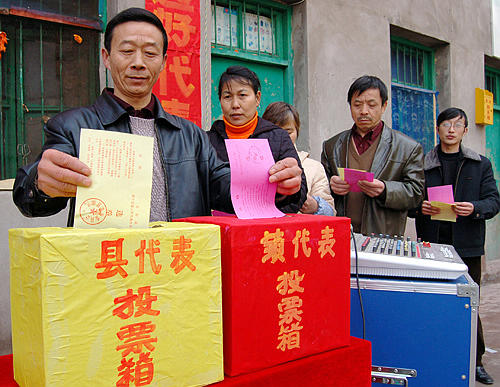|
 |
|
VOTE FOR GOOD: Local residents vote for lawmakers at county- and township-levels in Yunyang County, southwest China's Chongqing Municipality, in 2007 (CFP) |
Li Mengzhi still recalls how he entered the shortlist for head of the Yangxi County Committee of the Communist Party of China (CPC) in Guangdong Province.
On June 7, Li stood behind a podium with six other candidates where they would each deliver a 15-minute self-introduction speech. The 136 audience members then voted immediately after the last speech.
Li, an official in charge of housing and urban-rural development in Yangjiang City, which administers Yangxi, later learned via a text message that he was one of the two finalists competing for the top Party post in Yangxi. The message came from Li Zelin, a Standing Committee member of the Yangjiang City CPC Committee and organizer of the election.
Candidates for the preliminary election were required to be a county-level official under age 52, with a bachelor's degree or above and having worked in the civil service for at least two years. Twenty-one applicants in Yangjiang were qualified.
It's a novel thing but not the first case that the CPC is selecting a county-level head through a multi-candidate election. In 2008, four districts and counties under the jurisdiction of Guiyang, capital of Guizhou Province in southwest China, elected their Party heads this way.
In Guiyang's election, the initial candidates were nominated, and many qualified people were not allowed to stand as candidates. But in Yangxi's case, all qualified people could apply for candidacy "personally" or nominate themselves.
The key challenge in the selection of cadres was to ensure the initial nomination process used to select the shortlist as fair and credible as possible, said Zhu Lijia, a professor at the Chinese Academy of Governance.
"Yangxi has granted the right of initial nomination to more people, and that is demonstrative of democracy," he said. "Since those who were qualified and were willing to take the post could apply to compete transparently, it makes the process fairer and more competitive."
Yangxi's attempt showed the CPC's determination to advance inner-Party democracy, Zhu said.
Yangxi might set an example, said Wu Kechang, Dean of the School of Public Administration of the South China University of Technology. He believes restrictions for initial nominations will be exempted in future multi-candidate elections for Party heads in other regions.
People's deputies
China started elections of deputies to county- and township-level people's congresses, the local legislatures, on May 7.
More than 2 million lawmakers at county- and township-levels are elected during nationwide elections, held every five years, in more than 2,000 counties and 30,000 townships, according to the National People's Congress (NPC), the country's top legislature. More than 900 million people vote in county-level elections and more than 600 million in township races.
This year's elections grant, for the first time, equal representation in legislative bodies to rural and urban citizens.
An amendment to the Electoral Law was passed in March 2010, stipulating urban and rural areas enjoy the same proportion of deputies to the NPC and people's congresses at lower levels. The previous law stated each rural deputy represented a population four times that of an urban deputy, which was interpreted as "farmers only enjoy one quarter of the suffrage of their urban counterparts."
The difference was even eight times as great under the previous law, said a Xinhua News Agency report.
Around the beginning of this year's elections, there were campaign announcements on the Internet by several self-proclaimed "independent candidates" for people's congress deputies.
In response, an official with the Legislative Affairs Commission of the NPC Standing Committee said there is no such thing as an "independent candidate" in China, as it's not recognized by law.
The Electoral Law stipulates candidates for deputies to county- and township-level people's congresses should be nominated and confirmed in due legal procedures, the official said.
The Constitution and the Electoral Law grant qualified citizens the right to vote and to be elected, but election activities must adhere to the law and its specific provisions for the election procedures of lawmakers, the official said.
According to the Electoral Law, the procedures for election of lawmakers follow four steps. A citizen must first register and win confirmation of his or her qualifications for lawmaker candidacy. Then he or she will receive a nomination as "deputy candidate" by political parties, social organizations, or 10 or more voters in one constituency. Later, the list of official deputy candidates is determined based on the majority of opinions of the constituency, or in a preliminary vote if necessary. All campaign activities must be organized by electoral committees.
Under the law, electoral committees are set up to manage the election of local legislatures, including county- and township-level ones. The electoral committees responsible for election of county- and township-level legislatures are under the authority of standing committees of county-level legislatures.
The amendment to the Electoral Law also increases interaction between voters and candidates, saying electoral committees should arrange more face-to-face contacts between candidates and voters to allow deputy candidates to introduce themselves and answer voters' questions.
To allow more meetings, the amendment also extends the period for publicizing the name list of official candidates from five days to a week before the election day. | 